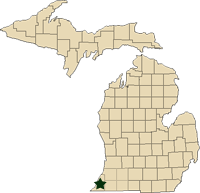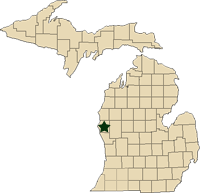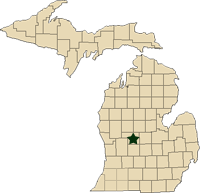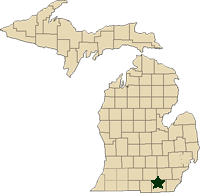Regional reports on Michigan vegetables – June 6, 2012
MSU Extension educators’ pest and vegetable updates for Michigan.
This week’s regional reports:
- Southwest Michigan – Ron Goldy
- West Central Michigan – Norm Myers
- Central Michigan – Fred Springborn
- Southeast Michigan – Lina Rodriguez Salamanca
Southwest Michigan – Ron Goldy, Michigan State University Extension
|
Weather
Temperatures for the week were below normal with highs ranging from 50 to 77oF and lows from 44 to 57oF. Average high for the week was 65oF when normal is 73oF. Precipitation for the area was near 1.0 inch. Moisture is again low and fields are being irrigated.
Crop Reports
Asparagus harvest is complete.
Harvest of early peas has begun.
Cool temperatures have kept early planted sweet corn at the six to eight-leaf stage. Subsequent planting continues.
Pepper and eggplant transplanting continues. Early planted peppers are in flower and are putting out secondary shoots. Staking of pepper fields has begun.
Harvest of tunnel-grown summer squash and zucchini has begun. Direct seeding in unprotected fields continues. Harvest from tunnel-grown cucumbers will begin soon.
Watermelon and cantaloupe transplants have gotten off to a good start. Many were set out prior to the rain and cool temperatures, minimizing transplant shock.
Low tunnels are being taken completely off tomatoes. Plants look healthy and fruit is 1 to 2 inches in diameter. Early planted, unprotected fields are in bloom. Transplants continue to be set out and plantings are being staked, tied and pruned.
Early planted potatoes are in bloom and are being hilled. Colorado potato beetle can be found.
West Central Michigan – Norm Myers, Michigan State University Extension
|
Weather
Some rain fell across our area over Friday and Saturday of last week, totaling from half an inch (western areas) to an inch (eastern areas.) Soils are still fairly dry and we could still use more rain. Winds continue to be a problem for spraying and irrigation.
Oceana, Newaygo and Mason Counties
We are hoping that as temperatures warm asparagus production will bump back up. Most growers would like to continue harvest until at least June 15th or even June 20th if possible. Quality has improved with the cooler weather, but we have yet to see yields return to normal. It is going to be difficult to supply both the very hot fresh market and the processing market if yields don’t improve. Growers with the ability to irrigate have already done so, some of them several times and feel that the irrigations have helped them maintain yields in those fields. Weeds are now becoming a problem in many asparagus fields and will get worse before the fields are laid by.
Carrot growers report insecticides are effective in controlling aster leafhoppers. Most carrot growers continue with their weed control programs. Previously planted vine crops are emerging and look to be normal. Peas are in full bloom in the Fremont area.
Muck Vegetable Growing Areas in Ottawa, Kent and Newaygo Counties
I visited muck growing areas yesterday with Dr. Szendrei. Onion Thrips are making an early emergence in both cabbage and onions. Both Diamond-back Moth are actively feeding in cabbage and Imported Cabbage Worms are actively laying eggs. Insecticides appear to be generally effective in controlling Aster Leafhopper in celery fields checked. Some new samples were collected for aster yellows index and we will await those results. Most onions are in the fourth leaf, but some of the early planted ones are as much as seventh leaf and the re-plants are of course only in the loop or flag stages.
Central Michigan – Fred Springborn, Michigan State University Extension
|
Weather
An all day drizzle with scattered thundershowers was experienced by much of the central region last Friday (June 1) with scattered showers continuing into Saturday. The much needed moisture aided germination and emergence and brought relief to advanced crops on the lighter soils and did cause some water ponding and minor flooding on the heavier soils. Rainfall totals were generally .8 to 1.25 inches Montcalm with higher amounts up to 2.5 inches reported by some growers in the Gratiot and Isabella areas. High air temperatures were quite cool for the season with 50.4°F recorded at Entrican on June 1, highs have been in the low 70s for much of the rest of the week. Low air temperatures were generally in the mid-40s. Low soil temperatures at 2 inches are in the lower to mid-50s.
Crops
Planting and field work has just resumed on many of the heavier soils. The light sands resumed work on Monday.
Dry bean planting has begun with approximately 10 percent of the crop planted in the central counties.
By in large, all potato planting is now complete. Colorado Potato Beetles can be found on volunteers at nearly all growth stages from winter adults through most larval stages. The window is closing in field corn to apply many herbicides for control of volunteer potatoes. There are additional reports from eastern states of late blight on tomatoes and potatoes, most notably Pennsylvania and New York.
Scattered reports of armyworm larval damage are coming in, though the outbreak does not appear to be as severe as many were fearing. Continue to scout fields. Most larvae are getting quite large but small larva can still be present and hard to spot.
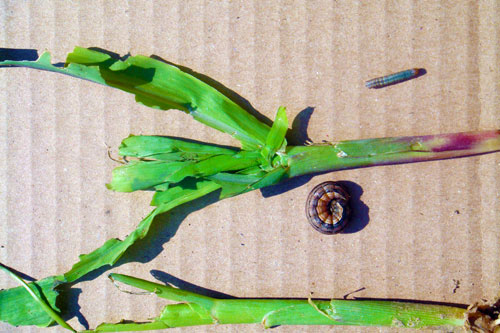
Scattered outbreaks of Armyworm feeding, such as this example in Eaton
County, are occurring around the state. Photo Credit: George Silva
No black cutworm moths have been captured for the past several weeks and only 1 true armyworm moth has appeared in my traps. To date I have not yet had any reports of significant black cutworm damage in the central region. I have had a few reports of field and sweet corn being clipped off which turned out to be Canada goose damage. See article from last year, Corn clipping curiosities.
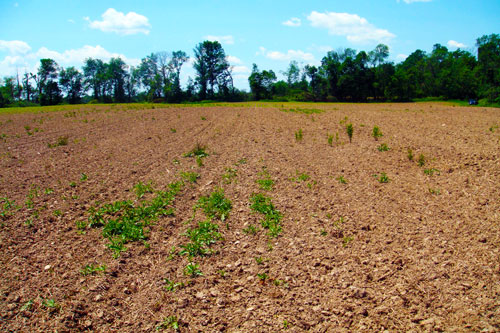
Corn damage. Photo credit: George Silva
Southeast Michigan – Lina Rodriguez Salamanca, Michigan State University Extension
|
Weather
In southeast Michigan, the lowest temperature was 46°F (June 2) and the highest temperature was 82°F. We are currently at 762 degree days (base 50F) and 1082 (base 45F), which is the highest in the last five years at this point in the growing season. Precipitation remains low in the area with only 0.9 inch of rain since May 22.
Crops
With the cool weather from last week, cabbage downy mildew has been observed in fields with young transplants. Cabbage planted early in the season are bearing good- sized heads and no downy mildew has reached those fields. Diamond back numbers spiked in a couple of fields last week and important damage was observed in fields in Monroe County.
Cucurbit downy mildew counts are low at the Monroe spore trap. No downy mildew symptoms have been observed in the cucumber or melon fields. Scouting will continue. Zucchini and squash harvest has started. Melons are starting to bear flowers.
Pepper and tomato transplanting in the field continues, but soon will be completed. Tomatoes transplanted early in the field have been staked or are in the process. These plants are bearing flowers, and in some fields fruit has started to develop. Growers are concerned that the lack of precipitation may result in vegetative growth and not flower production. The chance of rain for the following week is from 7 to 49 percent.
Late blight of potatoes and tomatoes was identified in New Jersey in potatoes. In southeast Michigan the risk remains low, contrary to other places in the state (see http://www.lateblight.org/forecasting.php).
In Ontario variegated cutworm activity was detected on tomatoes and sweet corn. No cutworm has been observed in southeast Michigan, but growers have observed some armyworms in sweet corn and insecticide programs are in place.



 Print
Print Email
Email